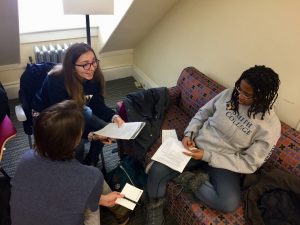
Students learn and practice generative knowledge interviewing, identify their own strengths, capacities and values and those of their peers.
If you want students to...:
- Explore identity and purpose through narrative
- Identify and articulate learning moments
Group Size:
Duration:
Instructions:
Generative Knowledge Interviewing (from Melissa Peet)
Take some notes about important learning experiences over the past year
Jot notes about two to four learning experiences that you’ve had in the past year. Write with just enough detail so that you’re able to talk about a couple of the experiences later. Try to include one academic experience, one out of the classroom experience, one example of a time when you were “outside of your comfort zone,” and one example of a time when you felt particularly alive and engaged.
Watch the group leader model the interviewing process.
Interview each other, taking turns in each role. (See attached PDF for full instructions.)
- First, decide who is going to time these interviews. That person needs to take out a phone or watch to get ready to time them.
- There should be 5 minutes for the speaker, and then 2 minutes of feedback.
- Then, you should rotate roles so that EACH OF YOU has a turn in EACH ROLE.
When everyone has had a turn, write without lifting your pen about one of the experiences that you just discussed in your group.
When you are writing, name at least one skill, capacity or value that you were practicing or developing.
If this is part of a portfolio, make a new post in the portfolio and paste in this piece of writing.
The title of your portfolio piece should use an action word and should name the skills that you practiced or developed.
Supplies:
PDF sheet for each student (see Facilitator Materials)
Pens
Index cards
Facilitator Materials:
Student Work Examples:
Samantha Peikes ‘18
Last semester I studied abroad with the School for Field Studies in the Wet Tropics of far northeast Queensland, Australia. In the last month of the program we were assigned directed research groups where we would use the skills that we learned in class to investigate and research a real-world environmental problem related to the region. These projects included a data collection period, a data analysis period, a scientific report, a poster, and a class presentation. The project I worked on dealt with conducting questionnairre surveys on risk perceptions to climate change throughout different towns and communities in the Wet Tropics. The questions varied from how vulnerable the region is to natural disasters, potential solutions to combat climate change, and what kinds of impacts, if any, will climate change have on the region.
I was extremely overwhelmed with all of the tasks that I needed to complete in order for the project to be successful. I had to push myself outside my comfort zone by being comfortable interviewing complete strangers from another country, some with wildly different environmental opinions than my own. In addition, I had to collaborate with my group to make sure we were all on the same page. However, as I started doing more research on how different groups of people perceive their own risks to climate change, I became more passionate on what I wanted the focus of my project to be. I thought about my own background of privilege and education. I know about climate change from the courses I took, but I am not at all vulnerable to its effects. I wondered how people in opposite situations to my own viewed climate change. The goal of my project was to determine how people of differing age groups, occupations, and education levels perceived their own risks to climate change. I also took the process step by step and focused on what my task was for each day.
After my group and I conducted all of our surveys, we began to categorize the information and narrow our research topics. Eventually, we started to write our scientific research papers, which included an abstract, an introduction, a methods section, results, and conclusion. Mine ended up being over 30 pages long!
The findings of my project were quite fascinating. I discovered that those with a higher levels of education were less vulnerable to the impacts of climate change, meaning that they tended to live inland and had more resources to combat flooding and cyclones, while those with less education lived closer to the coast and knew less about climate change. Additionally younger people tended to believe that climate change is accelerated by human activities, while older people tended to believe that it is naturally caused. People in farming occupations also understood the risks of climate change better than those working in retail related jobs, since they witness weather changes first hand through the effects on their crops.
When I finished the project, new questions had emerged: I wondered if the survey questions were somewhat biased, since we could only interview a select group of people. I also wondered if people could have mis-interpreted some of the questions on the survey or lacked the ability to answer fully due to time constraints. If I had the chance to do to project over again, I think I would look into where people got their news from to see if that had any influence over their opinions on climate change. We found that younger people tended to obtain information about climate change via social media, while older people tended to obtain their information via the local paper. Every news source presents climate change differently. This makes me wonder how the issues of climate change can be effectively presented to those with less education and fewer resources and who may only hear about climate change through unreliable media sources or through what others say. Overall, this was probably the most draining and difficult project I have ever partaken in, but it was by far the most rewarding.